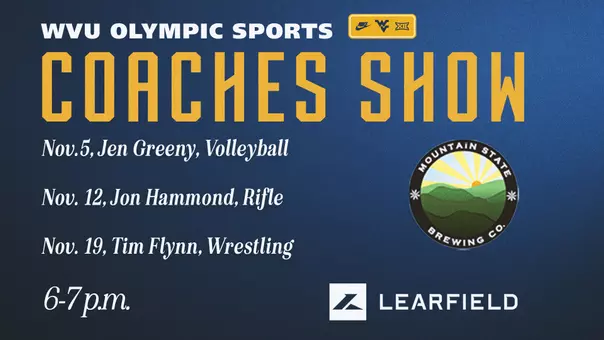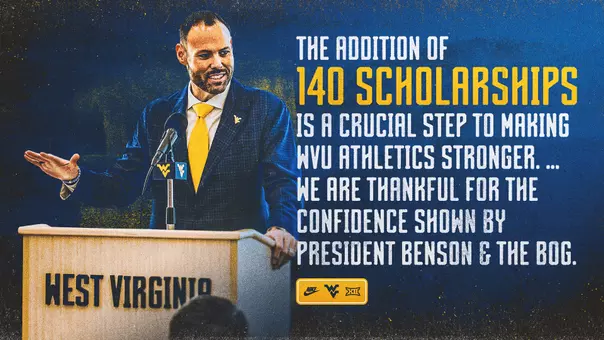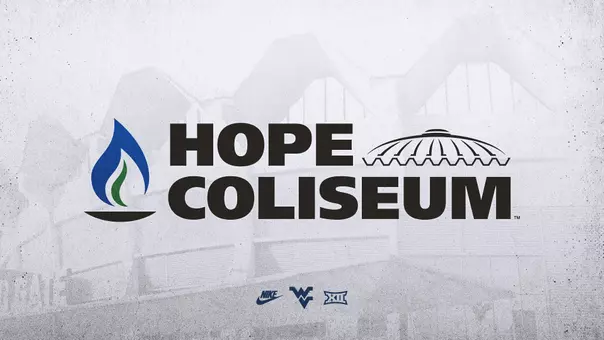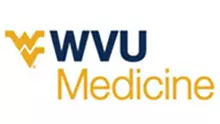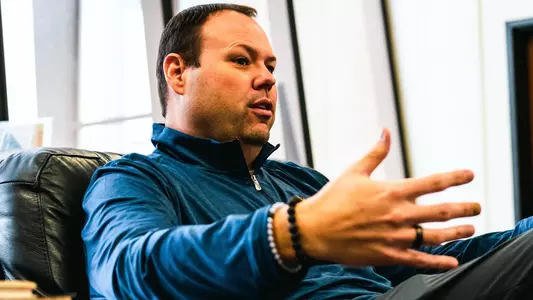
Photo by: WVU Athletic Communications
Ten For Wren – August 26, 2023
August 26, 2023 09:00 AM | General
MORGANTOWN, W.Va. – As another season of West Virginia University athletics gets under way, we caught up with a very busy Wren Baker to get his thoughts on some of the pressing issues confronting Mountaineer athletics and college sports as he begins his first full academic year leading the department.
Here are 10 questions for Wren:
WVUsports.com: You've had an eventful summer and now August has added to that with conference realignment. Has this been the most challenging time of your career as an athletics director?
Wren Baker: I think conference realignment was stressful, challenging and also exciting. There were so many twists and turns, but ultimately, I was really excited about the prospects sitting in front of the Big 12, and as a group, I think the ADs and presidents were all excited about what our membership was going to look like, whether we added or not. There is a really unified group among my colleagues, and ultimately, we felt like adding those markets and schools that could penetrate those markets in a meaningful way positioned the Big 12 very well for the future.
When you look at the overall landscape, I think the SEC television rights come up next and then the Big 12 comes up again. So, to have those markets going into the future puts us in a really good place.
There is going to be a new dynamic when we all get together and begin meeting on a regular basis. Even a day or two ago, we had a meeting and we were going through a topic and there were a couple of questions from some of the new members – and it was things that we had already covered previously but they haven't covered – and something was said in Dallas about the summer stuff we are doing, and I actually paused the discussion for a minute and suggested we give the new members a little more background about what we were trying to accomplish. For that part of it, there is a little bit of orientation required, but I think everybody is really excited to get those guys in. It was a great sign on our part and their part that literally hours after the deal was done, they made arrangements to be in Dallas to be at our meetings in person. It was great to spend time with our new colleagues there.
WVUsports.com: There was a fascinating story in USA Today recently about the price of college football realignment and the competitive disadvantages that can occur when moving up to power conferences. Since 2004, 15 programs have made the jump – including West Virginia – to a power conference outside of their geographic footprint and only 37% of the time they have finished the season with a winning record in league play. WVU falls in line with this by having had four winning conference seasons out of 11 since joining the Big 12. What are your thoughts on how programs can overcome some of these issues?
WB: When you have decades and decades of Power 5 revenues and Power 5 eyeballs on your product, it does give you a head start. I make reference a lot to our debt service being higher than most of our peers, and that will remain even in the new Big 12, but you look at the schools we are bringing in and they have high debt service too because there is a certain amount of catch-up that you're playing. We are going on just a little over a decade of having Power 5 revenue, so it's not like we've been cashing big revenue share checks all this time.
So, you know you have to catch up in football and basketball because of the revenue associated with it, but you also have all of your other sports that you are trying to get caught up. I don't think it's an insurmountable challenge. I've made reference to some of this recently in some of my comments, but the strongest thing we have going for us is our fan affinity, passion and loyalty that is unrivaled among all of our Big 12 peers. Unfortunately, we're not set up to capture and monetize that because we don't have a ton of suites and clubs; in fact, we are probably at the bottom of the league in our two biggest venues.
It's not an easy fix, but it's something that we can't keep kicking the can down the road because it becomes a self-fulfilling prophecy, and you just fall farther and farther behind. Schools that built suites and club seats two decades ago, well, now they are getting ready to have those paid for. That becomes a huge boost to their budget when that associated debt is about to be gone, which puts us at even a bigger disadvantage. This is something we're really going to spend a lot of time on over the next few months thinking about and having discussions with donors about. If we want to forever change the paradigm of our future from a financial perspective, we really have to look at where are some large revenue chunks that we can bring in?
We don't need the biggest budget in the league. I think it's woven into who we are as West Virginians to do more with less and roll up our sleeves and be more efficient, but we also can't be content to have a budget that's in the bottom third of our league. We've got to strive to get into that middle point and I think if we do that - and you add in our history and tradition; you add the passion and the loyalty that we have and the homecourt and homefield advantage that we have, I think we can be in position to compete at a very high level in the Big 12, which will put us in a really good spot nationally.
WVUsports.com: Within that USA Today story was reference to Missouri, a school of which you are very familiar, and the geographical recruiting approach it was required to make when it switched from the Big 12 to the SEC. When the Tigers were in the Big 12, they had a higher percentage of their players coming from Texas than they do today playing in the SEC. West Virginia has encountered this as well when it made the move from the Big East to the Big 12. Where is West Virginia's geographic sweet spot moving forward, in your opinion?
WB: We've had some success in Florida, but over the course of time probably the Northeast has been our best talent pool, and I think as the quality of the Big 12 gets better that will continue to be a great strength of ours. We've probably got to do a better job of establishing our market there by taking opportunities to do billboards and making sure we remind people of the great players we've had here. There are a variety of things we can do to address that challenge, but there has also got to be a little bit of intentionality to it as well.
Sometimes what happens when you have that switch, take Missouri for instance, it probably became harder for them to recruit Texas, but I also think when they were transitioning to the SEC there was an assumption made there that, hey, we're selling something different now than Iowa, Illinois and those Big Ten schools with the SEC, and let's try and get into those areas we haven't been in before. It's an evaluation of is that a goal worth pursuing? I know they began recruiting Florida a lot harder when they went into the SEC, and I don't think it was as productive as they hoped it would be.
There is probably more art than science, but what you have to try and do is extend that recruiting footprint by getting into new markets, but you can't do that at the expense of spending time in areas that have always been good to you. I think the last couple of years, our coaching staffs have really doubled down on trying to make sure we take care of business in the Northeast.
WVUsports.com: The Big 12 meetings took place last week. What are some of the things that came out of it that you can share with us?
 WB: There is an aggressiveness and an intentionality to make sure that we are all on the leading edge of a variety of things. Commissioner (Brett) Yormark, even though he has helped establish us as a stable conference, it's not lost on everybody that there is going to be a very significant revenue gap in the coming years between the SEC, Big Ten and everybody else. So, any way that we can address that gap is important. Commissioner Yormark is very aggressive at looking at ways to lessen that gap and that was where a lot of time was spent. Honestly, we had hoped to get into some scheduling, and we really weren't able to. Those meetings are being put on the calendar now because we just didn't get far into that as we would have like to. I think people will be very happy once they begin to see some of the initiatives coming out of the Big 12 over the course of the next 12 to 18 months.
WB: There is an aggressiveness and an intentionality to make sure that we are all on the leading edge of a variety of things. Commissioner (Brett) Yormark, even though he has helped establish us as a stable conference, it's not lost on everybody that there is going to be a very significant revenue gap in the coming years between the SEC, Big Ten and everybody else. So, any way that we can address that gap is important. Commissioner Yormark is very aggressive at looking at ways to lessen that gap and that was where a lot of time was spent. Honestly, we had hoped to get into some scheduling, and we really weren't able to. Those meetings are being put on the calendar now because we just didn't get far into that as we would have like to. I think people will be very happy once they begin to see some of the initiatives coming out of the Big 12 over the course of the next 12 to 18 months.
WVUsports.com: In terms of creating additional revenue, a good chunk of any added revenue could be eaten up in Olympic sports travel if it is not addressed properly. What are your thoughts on the Olympics sports component to the new Big 12?
WB: I think sometimes people see that you add a team that is geographically a lot of miles away from you and immediately they go to, "Oh, this is so much worse." I saw a comment from John Currie, the AD at Wake Forest, earlier this week, and he said they ran the numbers on their previous schedules, and they were already going to the West Coast in reference to the ACC potentially adding some teams from the West. I think the first thing is to just pause and realize how many of our teams are already traveling to different parts of the country already. We have teams that go out West all the time. There are ways to adjust. For instance, if your conference schedule requires you to go out West, then for nonconference you stay closer. Inherently, it doesn't mean the experience has to be different or worse for student-athletes. But as we're assessing this, it is reasonable to think that some of our Olympic sports and sports that don't charter could miss more class and encounter more travel time. Granted, not everybody sponsors all the sports, but with 16 schools, you can definitely break that into two eight-team divisions or some sports you can do four-team pods.
There is an opportunity to make our travel better than what it currently is. We are a geographically spread league now and so if we have an opportunity to do this – from a cost containment and a student-athlete experience – we need to look at that. Since the day I walked into this league, I have said this and there hasn't been a meeting go by when we've talked about expansion, about teams out West that I've said this is what's best for the Big 12 and West Virginia supports this, but if we expand west, we are adamant that we at least consider divisional or maybe even more regionalized scheduling, particularly in sports that don't charter.
If you take those Pac-12 teams, they have established rivalries and they're close to each other. Their fanbases know each other so they would rather play each other more often than come to West Virginia. If I was them, I would too. And I would rather them have to play each other more often and not have to go out there all the time, so it just makes a ton of sense for us to look at it and see if there is an easy way to do this. Now, you have to recognize when you are having these discussions not everything fits perfectly so maybe a school that is more in the interior but not one of the most interior, they could end up having worse travel. It doesn't break down equally for everybody, but we've got to be adults and put what's best for the league as a whole at the top of the list.
WVUsports.com: WVU football is back. What are you looking forward to most at your first home game on Sept. 9?
WB: I am eager to get out and spend more time with West Virginians and get a sense and a feel for that gameday environment. I've heard so many terrific things about it. I am generally on the move during game day. If you've seen me during basketball games, I don't sit much. They asked me where I want my season tickets and told them to call my wife. I'll never sit there. I'm a nervous roamer, and I also like to just observe and see what our restroom lines are like? What are our concession lines are like? Most game days, I will get somewhere between 25 and 30,000 steps.
WVUsports.com: You are asked a lot about football and men's basketball, of course, but you also run a department with many other sports. What are your overall expectations for those teams at WVU on a yearly basis?
WB: My expectation, first and foremost, is we have a culture where we value the person over the player and that we try and help people grow as people. They are here for a finite period of time, and we have a responsibility for them to leave as better people than when they arrived. We need to teach personal and social responsibility to make sure they are progressing academically, to make sure that they are ready to manage a bank account and to handle their finances when they leave here. I really believe if there is an intentionality to growing people that they will be the best player they can be, which will help us win games. Beyond that, you have to be realistic because there are some sports that we fund to compete at the top of the conference each year and there are some that we don't. We can churn coaches in and out that we feel aren't performing at the top of the league, but if the facilities and the resources and geography don't match those expectations, you are really doing a disservice to everyone involved.
We've done a really good job of objectively looking at how we resource all our sports compared to conference peers and regional peers. Part of our strategic vision moving forward will be having a list of initiatives to at least get everybody to the midpoint of the league. Now, that's not our final goal. Once we get there, then we will talk about how we can get into the top quartile. Overall, most of my conversations with our coaches have been really about how do we help support and grow people? I understand wins and losses are an important part of the metric, and I am as competitive as anybody, but I also think we've got to be realistic in some of our sports that may have weather challenges, geography challenges or resource challenges.
WVUsports.com: The Country Roads Trust recently rolled a new lager out in conjunction with Big Timber Brewing where 15% of the proceeds go to NIL initiatives. Have you tried it?
WB: I have. There is no anonymity for me in Morgantown and people ask what is the biggest difference between jobs here and at North Texas? The job, by and large, is the same, but at North Texas I could walk around anonymously, so I'm pretty intentional that I try not to drink publicly, but I'll have a beer at home. I had a chance to have one of the lagers the other day and I thought it was really good.
I think it's a good way to use the Trust. The University has not participated much in co-branding with alcoholic beverages to the degree that our peer institutions in the conference and in the region have. What that has done is capitalize on an untapped market for Country Roads Trust, and it was really a great strategy on their part. They are not using any of our marks, but they did ask us for our thoughts before they executed it, which I really appreciate. I think Stephen Ford, Oliver Luck and Ken Kendrick have done a great job with the Trust and this is just another way they are thinking outside the box a little bit, and it's making money, which will create additional opportunities for the young people in our program.
WVUsports.com: What is keeping you up at night, worrying?
WB: There are probably two primary things. One, nobody knows where college athletics is heading when you look at NIL, transfer portal, potential revenue sharing and those kinds of things. There is a path there that I think could lead to a lot of sports either going to non-scholarship or even eliminated. I just think back over the years all the young people who received opportunities to be on scholarship and got a college education through sports, and it would be a travesty if we allowed that to happen.
I understand the salaries have grown so much in revenue sports that perhaps it's time for us to relook at the model a little bit, but I really hope we do it in a way that doesn't come at the expense of people's sons and daughters, Olympic sports athletes and our Olympic sports program.
The other thing is after eight months here, I am more convinced than ever that we can and will compete for championships once we grow our revenue stream. We have to figure out a way to do that to give our coaches and student-athletes more resources that are competitive with our peers in a way that is still fair to fans and donors. Our ticket sales are up this year, so you want to reward that loyalty and not hurt affordability for fans, but you want to create more opportunities at the premium level to capture more dollars. I spend a lot of time thinking about how can we grow our budget and give our student-athletes and coaches more? I know if we can do that they are going to compete at an even higher level, but also to keep things affordable for our fan base.
I came from a state in Oklahoma with a blue-collar mentality that we can outwork everybody else. That same mentality also exists here. It's an important part of who we always will need to be, so I want to be clear here and say I don't believe we have to have more than everybody else. You can just follow the math. The teams that have the most resources win a vast majority of the time. I do not believe we are an institution that has to spend the most money, but we need to be closer to the average than to the bottom. That is something that is going to be a huge focus for me. I am 1,000% confident that we can get there, but I want to do it in a way that makes sure that we are still accessible and affordable to all West Virginians.
Fans, and even coaches, often come to me with a singular decision: Why can't we start softball? Why can't we pay this coach more? Coaches will come to me with a list and ask, why can't we do these things? I will always say that we can do any of those things, but we cannot do all those things. The reality is every decision you make is connected to every other decision when it requires money. It's no different than your budget at home. When you make a decision over here then that money has got to come from somewhere else. That's the educational process that an AD has a responsibility to do with their fanbase and with University leadership, but even internally within our department. Every decision is connected. It's a revenue and expense game.
WVUsports.com: Have you addressed with your staff, coaches and athletes your concern about what has been going on with the sports betting investigation in Iowa?
WB: Yes. I actually went to several of the team meetings, particularly football and men's basketball, and talked to our student-athletes specifically about it. There have been people lose their jobs and student-athletes lose their eligibility, and that was never the intent of the initial investigation. As I recall, the investigation began to get those gambling platforms that are not doing a good job of validating who is gambling; it was meant to catch them. People were creating ghost identities and maybe they were underaged and they were not supposed to be gambling. There was a geofence established in the Iowa and Iowa State campus, and it happened to catch some of their staff and athletes. They were bystanders, really. At this point, anyone working in college athletics knows that you are not supposed to be gambling on college sports. It's pounded and pounded into us.
My message to our student-athletes and staff is don't do it. If you place a bet, no matter where or how you do it, they know exactly to the 10-foot mark where that bet was placed, what device that bet was placed on and what account the money is coming from. It's not worth it. That's been my message, and oftentimes when something happens nationally, I will print that out and take time to use that as an example with our head coaches and staff. With that one I made it a priority because what happened at Iowa and Iowa State can happen anywhere. It's not just this topic but any major issue; let's learn from it.
Here are 10 questions for Wren:
WVUsports.com: You've had an eventful summer and now August has added to that with conference realignment. Has this been the most challenging time of your career as an athletics director?
Wren Baker: I think conference realignment was stressful, challenging and also exciting. There were so many twists and turns, but ultimately, I was really excited about the prospects sitting in front of the Big 12, and as a group, I think the ADs and presidents were all excited about what our membership was going to look like, whether we added or not. There is a really unified group among my colleagues, and ultimately, we felt like adding those markets and schools that could penetrate those markets in a meaningful way positioned the Big 12 very well for the future.
When you look at the overall landscape, I think the SEC television rights come up next and then the Big 12 comes up again. So, to have those markets going into the future puts us in a really good place.
There is going to be a new dynamic when we all get together and begin meeting on a regular basis. Even a day or two ago, we had a meeting and we were going through a topic and there were a couple of questions from some of the new members – and it was things that we had already covered previously but they haven't covered – and something was said in Dallas about the summer stuff we are doing, and I actually paused the discussion for a minute and suggested we give the new members a little more background about what we were trying to accomplish. For that part of it, there is a little bit of orientation required, but I think everybody is really excited to get those guys in. It was a great sign on our part and their part that literally hours after the deal was done, they made arrangements to be in Dallas to be at our meetings in person. It was great to spend time with our new colleagues there.
WVUsports.com: There was a fascinating story in USA Today recently about the price of college football realignment and the competitive disadvantages that can occur when moving up to power conferences. Since 2004, 15 programs have made the jump – including West Virginia – to a power conference outside of their geographic footprint and only 37% of the time they have finished the season with a winning record in league play. WVU falls in line with this by having had four winning conference seasons out of 11 since joining the Big 12. What are your thoughts on how programs can overcome some of these issues?
WB: When you have decades and decades of Power 5 revenues and Power 5 eyeballs on your product, it does give you a head start. I make reference a lot to our debt service being higher than most of our peers, and that will remain even in the new Big 12, but you look at the schools we are bringing in and they have high debt service too because there is a certain amount of catch-up that you're playing. We are going on just a little over a decade of having Power 5 revenue, so it's not like we've been cashing big revenue share checks all this time.
So, you know you have to catch up in football and basketball because of the revenue associated with it, but you also have all of your other sports that you are trying to get caught up. I don't think it's an insurmountable challenge. I've made reference to some of this recently in some of my comments, but the strongest thing we have going for us is our fan affinity, passion and loyalty that is unrivaled among all of our Big 12 peers. Unfortunately, we're not set up to capture and monetize that because we don't have a ton of suites and clubs; in fact, we are probably at the bottom of the league in our two biggest venues.
It's not an easy fix, but it's something that we can't keep kicking the can down the road because it becomes a self-fulfilling prophecy, and you just fall farther and farther behind. Schools that built suites and club seats two decades ago, well, now they are getting ready to have those paid for. That becomes a huge boost to their budget when that associated debt is about to be gone, which puts us at even a bigger disadvantage. This is something we're really going to spend a lot of time on over the next few months thinking about and having discussions with donors about. If we want to forever change the paradigm of our future from a financial perspective, we really have to look at where are some large revenue chunks that we can bring in?
We don't need the biggest budget in the league. I think it's woven into who we are as West Virginians to do more with less and roll up our sleeves and be more efficient, but we also can't be content to have a budget that's in the bottom third of our league. We've got to strive to get into that middle point and I think if we do that - and you add in our history and tradition; you add the passion and the loyalty that we have and the homecourt and homefield advantage that we have, I think we can be in position to compete at a very high level in the Big 12, which will put us in a really good spot nationally.
WVUsports.com: Within that USA Today story was reference to Missouri, a school of which you are very familiar, and the geographical recruiting approach it was required to make when it switched from the Big 12 to the SEC. When the Tigers were in the Big 12, they had a higher percentage of their players coming from Texas than they do today playing in the SEC. West Virginia has encountered this as well when it made the move from the Big East to the Big 12. Where is West Virginia's geographic sweet spot moving forward, in your opinion?
WB: We've had some success in Florida, but over the course of time probably the Northeast has been our best talent pool, and I think as the quality of the Big 12 gets better that will continue to be a great strength of ours. We've probably got to do a better job of establishing our market there by taking opportunities to do billboards and making sure we remind people of the great players we've had here. There are a variety of things we can do to address that challenge, but there has also got to be a little bit of intentionality to it as well.
Sometimes what happens when you have that switch, take Missouri for instance, it probably became harder for them to recruit Texas, but I also think when they were transitioning to the SEC there was an assumption made there that, hey, we're selling something different now than Iowa, Illinois and those Big Ten schools with the SEC, and let's try and get into those areas we haven't been in before. It's an evaluation of is that a goal worth pursuing? I know they began recruiting Florida a lot harder when they went into the SEC, and I don't think it was as productive as they hoped it would be.
There is probably more art than science, but what you have to try and do is extend that recruiting footprint by getting into new markets, but you can't do that at the expense of spending time in areas that have always been good to you. I think the last couple of years, our coaching staffs have really doubled down on trying to make sure we take care of business in the Northeast.
WVUsports.com: The Big 12 meetings took place last week. What are some of the things that came out of it that you can share with us?
 WB: There is an aggressiveness and an intentionality to make sure that we are all on the leading edge of a variety of things. Commissioner (Brett) Yormark, even though he has helped establish us as a stable conference, it's not lost on everybody that there is going to be a very significant revenue gap in the coming years between the SEC, Big Ten and everybody else. So, any way that we can address that gap is important. Commissioner Yormark is very aggressive at looking at ways to lessen that gap and that was where a lot of time was spent. Honestly, we had hoped to get into some scheduling, and we really weren't able to. Those meetings are being put on the calendar now because we just didn't get far into that as we would have like to. I think people will be very happy once they begin to see some of the initiatives coming out of the Big 12 over the course of the next 12 to 18 months.
WB: There is an aggressiveness and an intentionality to make sure that we are all on the leading edge of a variety of things. Commissioner (Brett) Yormark, even though he has helped establish us as a stable conference, it's not lost on everybody that there is going to be a very significant revenue gap in the coming years between the SEC, Big Ten and everybody else. So, any way that we can address that gap is important. Commissioner Yormark is very aggressive at looking at ways to lessen that gap and that was where a lot of time was spent. Honestly, we had hoped to get into some scheduling, and we really weren't able to. Those meetings are being put on the calendar now because we just didn't get far into that as we would have like to. I think people will be very happy once they begin to see some of the initiatives coming out of the Big 12 over the course of the next 12 to 18 months.WVUsports.com: In terms of creating additional revenue, a good chunk of any added revenue could be eaten up in Olympic sports travel if it is not addressed properly. What are your thoughts on the Olympics sports component to the new Big 12?
WB: I think sometimes people see that you add a team that is geographically a lot of miles away from you and immediately they go to, "Oh, this is so much worse." I saw a comment from John Currie, the AD at Wake Forest, earlier this week, and he said they ran the numbers on their previous schedules, and they were already going to the West Coast in reference to the ACC potentially adding some teams from the West. I think the first thing is to just pause and realize how many of our teams are already traveling to different parts of the country already. We have teams that go out West all the time. There are ways to adjust. For instance, if your conference schedule requires you to go out West, then for nonconference you stay closer. Inherently, it doesn't mean the experience has to be different or worse for student-athletes. But as we're assessing this, it is reasonable to think that some of our Olympic sports and sports that don't charter could miss more class and encounter more travel time. Granted, not everybody sponsors all the sports, but with 16 schools, you can definitely break that into two eight-team divisions or some sports you can do four-team pods.
There is an opportunity to make our travel better than what it currently is. We are a geographically spread league now and so if we have an opportunity to do this – from a cost containment and a student-athlete experience – we need to look at that. Since the day I walked into this league, I have said this and there hasn't been a meeting go by when we've talked about expansion, about teams out West that I've said this is what's best for the Big 12 and West Virginia supports this, but if we expand west, we are adamant that we at least consider divisional or maybe even more regionalized scheduling, particularly in sports that don't charter.
If you take those Pac-12 teams, they have established rivalries and they're close to each other. Their fanbases know each other so they would rather play each other more often than come to West Virginia. If I was them, I would too. And I would rather them have to play each other more often and not have to go out there all the time, so it just makes a ton of sense for us to look at it and see if there is an easy way to do this. Now, you have to recognize when you are having these discussions not everything fits perfectly so maybe a school that is more in the interior but not one of the most interior, they could end up having worse travel. It doesn't break down equally for everybody, but we've got to be adults and put what's best for the league as a whole at the top of the list.
WVUsports.com: WVU football is back. What are you looking forward to most at your first home game on Sept. 9?
WB: I am eager to get out and spend more time with West Virginians and get a sense and a feel for that gameday environment. I've heard so many terrific things about it. I am generally on the move during game day. If you've seen me during basketball games, I don't sit much. They asked me where I want my season tickets and told them to call my wife. I'll never sit there. I'm a nervous roamer, and I also like to just observe and see what our restroom lines are like? What are our concession lines are like? Most game days, I will get somewhere between 25 and 30,000 steps.
WVUsports.com: You are asked a lot about football and men's basketball, of course, but you also run a department with many other sports. What are your overall expectations for those teams at WVU on a yearly basis?
WB: My expectation, first and foremost, is we have a culture where we value the person over the player and that we try and help people grow as people. They are here for a finite period of time, and we have a responsibility for them to leave as better people than when they arrived. We need to teach personal and social responsibility to make sure they are progressing academically, to make sure that they are ready to manage a bank account and to handle their finances when they leave here. I really believe if there is an intentionality to growing people that they will be the best player they can be, which will help us win games. Beyond that, you have to be realistic because there are some sports that we fund to compete at the top of the conference each year and there are some that we don't. We can churn coaches in and out that we feel aren't performing at the top of the league, but if the facilities and the resources and geography don't match those expectations, you are really doing a disservice to everyone involved.
We've done a really good job of objectively looking at how we resource all our sports compared to conference peers and regional peers. Part of our strategic vision moving forward will be having a list of initiatives to at least get everybody to the midpoint of the league. Now, that's not our final goal. Once we get there, then we will talk about how we can get into the top quartile. Overall, most of my conversations with our coaches have been really about how do we help support and grow people? I understand wins and losses are an important part of the metric, and I am as competitive as anybody, but I also think we've got to be realistic in some of our sports that may have weather challenges, geography challenges or resource challenges.
WVUsports.com: The Country Roads Trust recently rolled a new lager out in conjunction with Big Timber Brewing where 15% of the proceeds go to NIL initiatives. Have you tried it?
WB: I have. There is no anonymity for me in Morgantown and people ask what is the biggest difference between jobs here and at North Texas? The job, by and large, is the same, but at North Texas I could walk around anonymously, so I'm pretty intentional that I try not to drink publicly, but I'll have a beer at home. I had a chance to have one of the lagers the other day and I thought it was really good.
I think it's a good way to use the Trust. The University has not participated much in co-branding with alcoholic beverages to the degree that our peer institutions in the conference and in the region have. What that has done is capitalize on an untapped market for Country Roads Trust, and it was really a great strategy on their part. They are not using any of our marks, but they did ask us for our thoughts before they executed it, which I really appreciate. I think Stephen Ford, Oliver Luck and Ken Kendrick have done a great job with the Trust and this is just another way they are thinking outside the box a little bit, and it's making money, which will create additional opportunities for the young people in our program.
WVUsports.com: What is keeping you up at night, worrying?
WB: There are probably two primary things. One, nobody knows where college athletics is heading when you look at NIL, transfer portal, potential revenue sharing and those kinds of things. There is a path there that I think could lead to a lot of sports either going to non-scholarship or even eliminated. I just think back over the years all the young people who received opportunities to be on scholarship and got a college education through sports, and it would be a travesty if we allowed that to happen.
I understand the salaries have grown so much in revenue sports that perhaps it's time for us to relook at the model a little bit, but I really hope we do it in a way that doesn't come at the expense of people's sons and daughters, Olympic sports athletes and our Olympic sports program.
The other thing is after eight months here, I am more convinced than ever that we can and will compete for championships once we grow our revenue stream. We have to figure out a way to do that to give our coaches and student-athletes more resources that are competitive with our peers in a way that is still fair to fans and donors. Our ticket sales are up this year, so you want to reward that loyalty and not hurt affordability for fans, but you want to create more opportunities at the premium level to capture more dollars. I spend a lot of time thinking about how can we grow our budget and give our student-athletes and coaches more? I know if we can do that they are going to compete at an even higher level, but also to keep things affordable for our fan base.
I came from a state in Oklahoma with a blue-collar mentality that we can outwork everybody else. That same mentality also exists here. It's an important part of who we always will need to be, so I want to be clear here and say I don't believe we have to have more than everybody else. You can just follow the math. The teams that have the most resources win a vast majority of the time. I do not believe we are an institution that has to spend the most money, but we need to be closer to the average than to the bottom. That is something that is going to be a huge focus for me. I am 1,000% confident that we can get there, but I want to do it in a way that makes sure that we are still accessible and affordable to all West Virginians.
Fans, and even coaches, often come to me with a singular decision: Why can't we start softball? Why can't we pay this coach more? Coaches will come to me with a list and ask, why can't we do these things? I will always say that we can do any of those things, but we cannot do all those things. The reality is every decision you make is connected to every other decision when it requires money. It's no different than your budget at home. When you make a decision over here then that money has got to come from somewhere else. That's the educational process that an AD has a responsibility to do with their fanbase and with University leadership, but even internally within our department. Every decision is connected. It's a revenue and expense game.
WVUsports.com: Have you addressed with your staff, coaches and athletes your concern about what has been going on with the sports betting investigation in Iowa?
WB: Yes. I actually went to several of the team meetings, particularly football and men's basketball, and talked to our student-athletes specifically about it. There have been people lose their jobs and student-athletes lose their eligibility, and that was never the intent of the initial investigation. As I recall, the investigation began to get those gambling platforms that are not doing a good job of validating who is gambling; it was meant to catch them. People were creating ghost identities and maybe they were underaged and they were not supposed to be gambling. There was a geofence established in the Iowa and Iowa State campus, and it happened to catch some of their staff and athletes. They were bystanders, really. At this point, anyone working in college athletics knows that you are not supposed to be gambling on college sports. It's pounded and pounded into us.
My message to our student-athletes and staff is don't do it. If you place a bet, no matter where or how you do it, they know exactly to the 10-foot mark where that bet was placed, what device that bet was placed on and what account the money is coming from. It's not worth it. That's been my message, and oftentimes when something happens nationally, I will print that out and take time to use that as an example with our head coaches and staff. With that one I made it a priority because what happened at Iowa and Iowa State can happen anywhere. It's not just this topic but any major issue; let's learn from it.
Reid Carrico | Nov. 8
Saturday, November 08
Diore Hubbard | Nov. 8
Saturday, November 08
Rich Rodriguez | Nov. 8
Saturday, November 08
Curtis Jones Jr. | Nov. 8
Saturday, November 08
